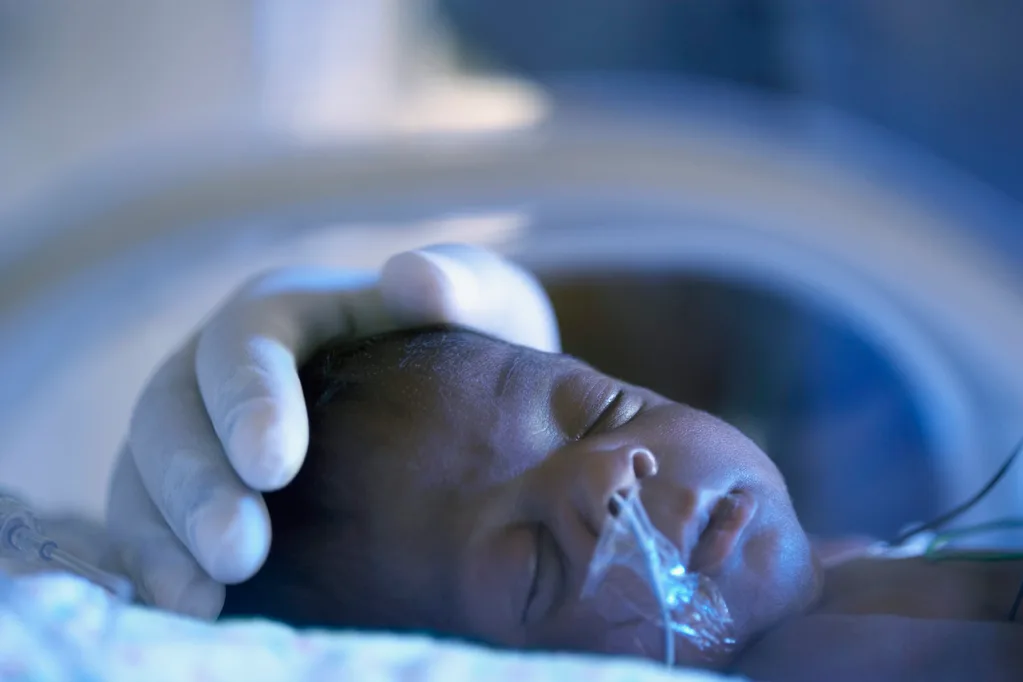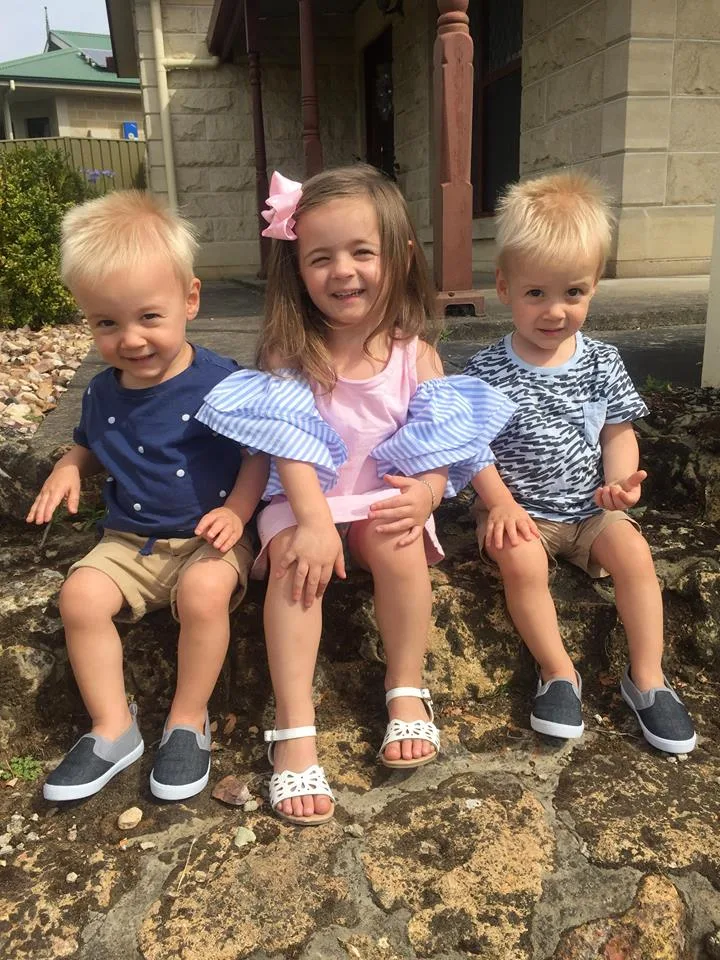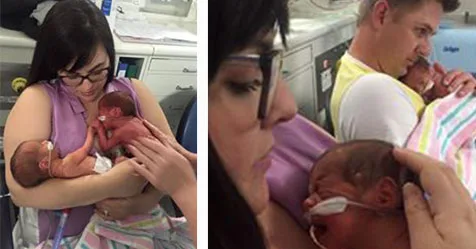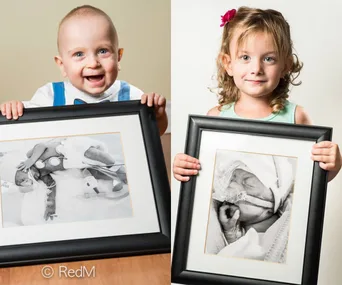Amanda Davis, 31, Mount Gambier, SA, shares her real life story
I took a sip of tea and rubbed my swollen belly.
My husband, Craig, and I were at a friend’s wedding, and I was 20 weeks pregnant.
The pregnancy had been a long time coming. I’d been diagnosed with polycystic ovaries and endometriosis when I was younger and was told I couldn’t conceive naturally.
So we opted for IVF but didn’t expect it to take three years to work. When we found out I was expecting twins, we felt very blessed.
As the wedding music blared, I got up to go to the bathroom.
“I have a funny tummy,” I whispered to Craig.
But when I got to the loo, I saw blood.
Oh, God.
I ran back to Craig and told him we needed to go straight to the hospital.
There, a nurse checked me over.
“You’re in labour,” she said. “We will try to stop it progressing.”
They gave me a few injections but nothing worked. My bubs were on their way. A nurse came in to chat with me.
“If they’re coming, they’re going to die,” she said quietly.
I already knew they wouldn’t fight to save such premature babies, but that didn’t make it any easier. Tears flowed down my cheeks as I started having contractions.

“A few days later, we held a funeral for them.”
After seven hours of labour, Craig held my hand as I gave birth to twin girls who we named Lila and Harper. Their tiny lungs weren’t strong enough to take more than a few breaths. They lived for six precious minutes and then passed away.
“Mummy and Daddy love you so much,” I said, kissing their minuscule faces. A kind midwife brought us some baby beanies so we could take photos together. We also had prints made of their tiny hands and feet.
When they finally took my girls away, I cried for three hours in Craig’s arms.
A few days later, we held a funeral for them.
Just a month later, we decided to undergo another round of IVF. Even though we were heartbroken, we still desperately wanted a family.
I was cautiously excited when I learnt I was expecting another little girl. I saw my obstetrician every week and could see my bub growing healthily inside me.
At 38 weeks, I was two days away from being induced when I woke up in a pool of blood. Craig rushed me to the hospital and I gave birth to a healthy baby girl, Violet, via caesarean.
She was so beautiful. It was the best day of our lives.
We had one more embryo left from our last round of IVF, so when Violet was one, we had it inserted in the hopes of giving her a brother or sister.
We moved from Adelaide to Mount Gambier and started to set up a life for ourselves. I fell pregnant and Craig and I went along to the ultrasound.
“It’s twins,” the sonographer announced, smiling.
I plastered a smile on my face but a wave of dread washed over me.
What if I lost these babies too? Craig and I couldn’t take any more heartbreak.
If we could make it past the first 23 weeks, our bubs would have a fighting chance. Thankfully, 23 weeks came and went, as did 24 and 25.
Because Mount Gambier didn’t have a major hospital, we decided it was best I give birth in Adelaide.
We learnt we were having twin boys and I wanted to give them the best start in life.
So at 30 weeks, I packed the car so Violet and I could stay with a friend until I gave birth, scheduled for 34 weeks, while Craig stayed back for work.
The plan was that as soon as I was in labour, he’d meet me at the hospital.
I hadn’t left home yet for Adelaide and was feeding Violet her brekkie when I felt a contraction. Craig was hosting an event at work, so I quickly called him.

Violet and the twins.
Source: Supplied
“Don’t freak out, but the babies are coming,” I said, trying to keep calm.
He sped home and took us to the local hospital, where his mum met us to look after Violet.
They tried to delay the labour again, because even though they’d held on longer, coming into the world four weeks before their due date was still a risk.
Unfortunately, it didn’t work.
A nurse called the Royal Flying Doctor Service to have us airlifted to Adelaide because the hospital wasn’t equipped to support premature babies. My babies were going to need oxygen support and the hospital only had one machine.
But the bubs were coming fast. After only a few hours of labour, my obstetrician checked me over.
“These babies need to come out right now. I’m really sorry,” she said.
I turned to Craig, who sat there looking pale with his face in his hands. I could tell what he was thinking.
Please, God, not this again.
It was like an awful case of déjà vu.
I was given an emergency caesarean and our twin boys, Preston and Nash, were whisked away as soon as they were born. I didn’t get to see them but I heard their beautiful cries.
Preston was placed on oxygen while a doctor had to manually pump oxygen into Nash’s little lungs.
Outside, a storm raged.
“How is the air ambulance even going to make it here?” I fretted to Craig. Our babies’ lives were held in the balance. I watched the minutes tick painfully by as we waited for the RFDS to arrive.
Suddenly the door burst open and a nurse raced in.
“They’re here,” she cried.

“Seeing my boys covered in cords with tubes everywhere was heartbreaking, but I knew they were keeping them alive.”
Source: Supplied
Relief washed over me. They had brought equipment with them and worked on our bubs for a couple of hours before they felt they were stable enough to take them to Adelaide.
I wasn’t allowed to go with them as I was still recovering from surgery.
Within an hour, they’d touched down and were placed in the care of neonatal specialists. It was hard being away from them, but the hospital kept us updated with their progress.
The next day, I caught another RFDS flight to meet them and Craig followed in the car with Violet.
Seeing my boys covered in cords with tubes everywhere was heartbreaking, but I knew they were keeping them alive.
Each day, they grew a little bit stronger, and after 10 weeks in intensive care, Craig and I brought our boys home.
Preston and Nash are now two, and even though they’re slightly small for their age, they are meeting all their milestones. Their big sister Violet, four, absolutely adores them, and Craig and I couldn’t feel more blessed.
We’ll never forget our firstborn girls Lila and Harper, and are constantly reminded of how close we came to losing our second set of premmie twins. If it weren’t for the specialist care and the emergency flight the RFDS provided, they wouldn’t be here with us.
We’re eternally grateful that because of them, history didn’t repeat itself.
